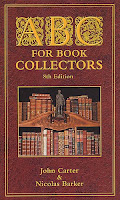AUTHOR’S CORRECTIONS
The larger changes made by an author to his work after it has been set up in type and before it is printed, the cost of which is charged by the printer, as distinct from printer’s errors. Some authors continue to rewrite even after a book has been printed, necessitating cancels (for which the printer will send in another bill); if their work is attended with success, this process may be extended to its subsequent forms. Their printers (or publishers) may tire of it, but the book collector will delight in the multiplicity of editions and impressions, issues and states, thus distinguished. The capacity of the author to generate and alter texts electronically has diminished the burden in time and money, but by no means eradicated it.
AUTHORIZED EDITION
When the collector of first editions is called upon to explain or defend his pursuit, he often emphasizes the importance (as well as the sentimental appeal) of the earliest authentic text. But when he sees ‘first authorized edition’ in a catalogue description, that argument is apt to yield to his preference for chronological priority. For he will infer that this authorized edition was preceded by an unauthorized one; and even though he may take this opportunity of acquiring the former, he will nevertheless probably continue to covet the latter as well (and even more violently).
A good many 16th, 17th and 18th century books were first printed without their authors’ consent – Browne’s Religio Medici 1642, Prior’s Poems 1707 and La Rochefoucauld’s Maximes 1664 are well known examples, and Woodfall’s authorized edition of The Letters of Junius 1772 was preceded by dozens of unauthorized ones. Such editions were printed sometimes from correct, sometimes from garbled manuscripts, furnished by or purloined from the friends among whom they were circulating.
In the 19th century, popular works serialized in magazines were specially liable to piracy, whether Thackeray appearing in New York, Emerson in London or Balzac in Brussels earlier than from their accredited publishers. To the French legitimacy is sacred and insularity traditional: édition originale, when used of a native author, means not first edition but the first authorised edition printed in France. In England and America, collectors and the trade have usually regarded a first unauthorized edition of domestic production as something to be taken seriously and priced much higher than the subsequent first authorized edition. The products of foreign enterprise, whether translated or (more rarely) in the original, have a special fascination for the keen author-collector.
Previous ABC’s of Book Collecting posts
Carter, John & Nicolas Barker
ABC’s of Book Collecting. 8th Edition
New Castle, Delaware : Oak Knoll Press, 2004
Thanks to Oak Knoll Press for permission to reprint

